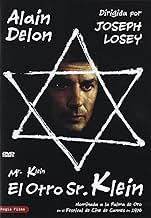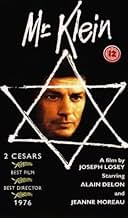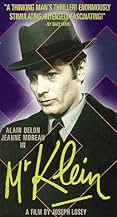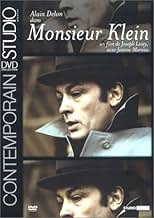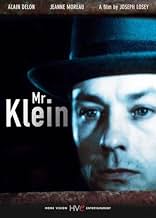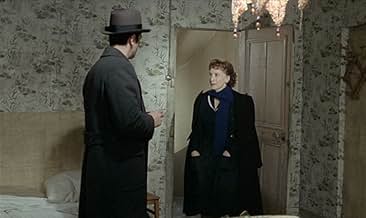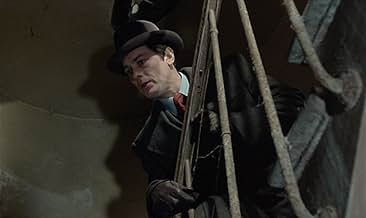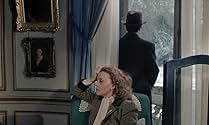Nella Parigi occupata dai nazisti, un immorale commerciante d'arte conduce una vita di lusso, fino a quando una copia di un giornale ebraico lo porta all'attenzione della polizia, collegando... Leggi tuttoNella Parigi occupata dai nazisti, un immorale commerciante d'arte conduce una vita di lusso, fino a quando una copia di un giornale ebraico lo porta all'attenzione della polizia, collegandolo a un misterioso sosia. Può scagionarsi?Nella Parigi occupata dai nazisti, un immorale commerciante d'arte conduce una vita di lusso, fino a quando una copia di un giornale ebraico lo porta all'attenzione della polizia, collegandolo a un misterioso sosia. Può scagionarsi?
- Regia
- Sceneggiatura
- Star
- Premi
- 3 vittorie e 6 candidature totali
- Nicole
- (as Francine Berge)
- Pierre
- (as Michel Lonsdale)
- Lola - la danseuse
- (as Magali Clement)
Recensioni in evidenza
The story takes place in German-occupied Paris in the winter of 1942. Robert Klein (Alain Delon) is an art dealer who leads a comfortable life by taking advantage of the opportunity to buy at low prices paintings from the collections of Jews who were forbidden to practice their professions or trades and who had to sell household objects, including art, in order to survive. The ambiguity of his Alsatian name puts him in an awkward position when he is mistaken for another, Jewish, Robert Klein and begins to receive the newspaper of the Jewish community. Being a Jew in occupied Paris was more than a social stigma, and in trying to clarify the situation, Mr. Klein became entangled in the intricacies of the Petain regime's bureaucracy. The search for his alter-ego becomes a kind of police intrigue in a world that has become absurd according to the criteria of logic and legality that he had known until then. Gradually, he begins to open his eyes to the extent of the discrimination suffered by the Jews and which he had taken advantage of until then nonchalantly. Trying to prove his own 'national purity', Mr Klein starts to get closer the other Robert Klein, who had endangered, intentionally or unintentionally, his easy existence until then. The two Robert Kleins never meet but their destinies are linked.
The quality of Joseph Losey's film-making is remarkable. Paris under occupation, decadent and indifferent, in which part of the population had adopted the slogans, policies and racial legislation of the occupiers and had become complicit in persecutions and deportations denying the democratic principles of France, is brought to the screen with authenticity and carelessness. Attentive as always to detail, Losey creates various interior sets, from the hero's sophisticated apartment or residence in a castle of the probable mistress of the other Robert Klein to his rented, miserable and rat-infested house or the corridors of the police prefectures. The streets are deserted, cold, hostile and if vehicles appear they are police or Gestapo cars. Music plays an important role in two key scenes, one taking place in the castle, the other in a cabaret. The sound of the phones is as threatening as in Hitchcock's movies. Last but not least, the final scene is probably the first on-screen rendition in a feature film of the arrests and deportations of the Paris Jews from the Winter Velodrome, a historical episode kept under silence until then, which many French would have preferred to forget. Alain Delon builds his role between nonchalance and defiance, between trying to ignore realities and assuming them. Among the actors in the cast, I must also mention Jeanne Moreau and Michael Lonsdale, two formidable actors who are cast here in consistent supporting roles. The ending is debatable and was debated, open to many interpretations that have not, I think, been definitively settled by this day. IMDB mentions that Costa-Gavras also contributed to the script, although he is not listed in the credits. 'Mr. Klein' is a must-see film about occupied France and the attitude of the French towards the Holocaust, a film worth seeing, thinking about and discussing.
"Mr. Klein" is a complex, subtle, scary, and nightmarish film made by a very talented director who had to leave his country, the USA, in the beginning of the 50s and who knew a thing or two about paranoia and hatred multiplied by the power and turned into indifferent killing machine. Once you are inside this machine, "Abandon hope all ye who enter here". Losey's film is often described as a blend of Hitchcock's thrillers where the heroes must deal with the mistaken identity and Kafka's nightmares of "The Trial" and I agree with the description. I only want to add that the film brings to mind Edgar Poe's short story "William Wilson" which was adapted to the screen by Luis Malle as a part of the trilogy "Histoires extraordinaires" (1968) and Alain Delon played both William Wilson and the mysterious man, his double, his conscience, his dark and hidden side. "Mr. Klein" also reminds another underrated, rarely seen but very interesting Ingmar Bergman's film "The Serpent's Egg" (1977) as well as Bob Fosse's masterpiece "Cabaret". The themes of the Feast during the Time of Plague, the helplessness and distress of the terrorized members of society that face the merciless and inevitable force of history and would perish without a trace, are similar in all three movies. Despite these similarities, "Mr. Klein" is an outstanding film on its own merits. What saddens me is the fact that is little known, rarely seen and almost never mentioned even among the film buffs.
A doctor's office.A woman stands here in the nude.He's no longer a doctor but a vet,examining the scared patient as if she's a cow."She might belong to those inferior races.A dubious case."He mumbles to his nurse.
"Monsieur Klein" is rarely mentioned when they praise Joseph Losey.It could be his finest achievement ,the success of a work fascinated by decay,from "the gypsy and the gentleman" to "the servant".
Like the heroes of the two mentioned works,when the movie begins,Monsieur Klein (Alain Delon,whose performance is memorable,anyway it's his last great part)is a bon vivant.A bourgeois vulture who buys paintings and other works of art for next to nothing from the Jews during the Occupation in France.One day,he receives a news paper called "les informations juives".Thus he discovers he's got a namesake.At first puzzled,Klein becomes more and more involved in a search of this man ,his doppelganger,his twin,who plays cat and mouse with him.Both realist and dreamlike,not to say nightmarish,à la Kafka,and metaphysical,à la Borges ,as the precedent user wrote,Klein's quest is both mad and logical,absurd and passionate.A sublime sequence shows Delon in a crowded café :a waiter 's calling "Monsieur Klein";first he does not care because he knows "they " call the "other",but finally,he asks the waiter who tells him that the person who called "Monsieur Klein" looked just like him.Then the baffled Delon sees his reflection in a mirror.
In 1942,in Paris ,there are ominous plans.In the desert streets ,in the small early hours,French gendarmes silently move ,as if they are rehearsing for something better left unsaid.The color movie almost turns black and white in a riveting cinematographic tour de force.
Robert Klein becomes like Lewis Caroll's Alice in the well.He could avoid the fall,but he will not.His world,now that he's a suspect for the police,is collapsing.It's his turn to sell his valuable properties for a song.
In the vel' d'hiv' (winter velodrome),the roundup of Jews had begun.Klein could escape,because his lawyer found the papers that proved that "he 's got no Jewish blood in his veins",but he would like to know this other himself and he would follow him even if it were into hell.It was indeed,as the train slowly moves off,heading for the concentration camps.
A first-class work,"Monsieur Klein" leaves the audience numb and ill-at-ease.A topflight supporting cast (Suzanne Flon,Jean Bouise,Michel Lonsdale,Jeanne Moreau) shines.
MONSIEUR KLEIN is a very different Delon policier. Set in Occupied Paris, its police are Gestapo stooges doggedly and po-facedly seeking out phoney Frenchmen, with one of whom Klein, Catholic, collaborationist-befriending, art-dealing war-profiteer, seems to be confused, with inevitable consequences.
Losey's nausea-inducing camerawork, his use of ugly colour and shadows which literally swallows up the brightest of film-stars, the recreation of Nazi France, the playing with ideas of play, the combining of exciting thriller with Borges and Kafka, makes this one of the best films of the 70s.
Alain Delon's Top 10 Films, Ranked
Alain Delon's Top 10 Films, Ranked
Lo sapevi?
- QuizThis was originally going ahead as a Costa Gavras project in 1974.
- Citazioni
Le vendeur: Six hundred louis.
Mr. Robert Klein: Three hundred.
Le vendeur: You must be joking. At that price, I'd rather keep it.
Mr. Robert Klein: As you wish.
Le vendeur: It's easy for you, when a man is forced to sell.
Mr. Robert Klein: But I'm not forced to buy. I'm not a collector. For me it's just a job.
Le vendeur: Make me a reasonable offer.
Mr. Robert Klein: Three hundred.
- ConnessioniFeatured in Les rendez-vous du dimanche: Episodio datato 6 marzo 1977 (1977)
I più visti
- How long is Mr. Klein?Powered by Alexa
Dettagli
- Data di uscita
- Paesi di origine
- Lingua
- Celebre anche come
- Chi è Mr. Klein?
- Luoghi delle riprese
- Brasserie La Coupole - 102 Boulevard Montparnasse, Paris 14, Parigi, Francia(Mr Klein called by the bellboy)
- Aziende produttrici
- Vedi altri crediti dell’azienda su IMDbPro
Botteghino
- Budget
- 3.500.000 USD (previsto)
- Lordo Stati Uniti e Canada
- 213.769 USD
- Fine settimana di apertura Stati Uniti e Canada
- 15.915 USD
- 8 set 2019
- Lordo in tutto il mondo
- 219.070 USD
- Tempo di esecuzione2 ore 3 minuti
- Mix di suoni
- Proporzioni
- 1.66 : 1
Contribuisci a questa pagina




